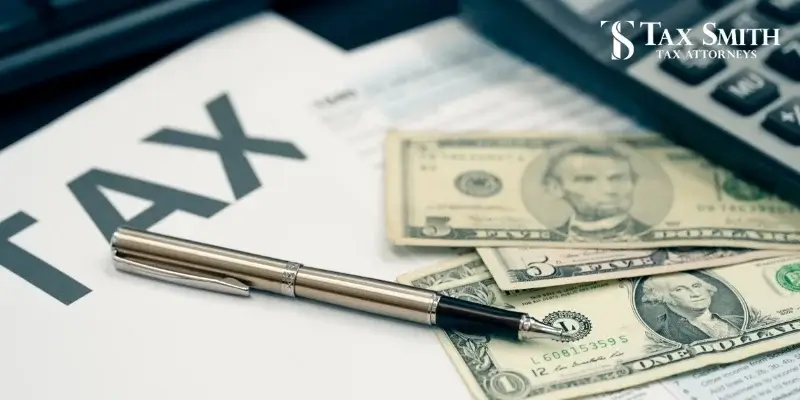If you are planning on purchasing a house, and you owe federal taxes, you may have options that allow you to meet your goal of home ownership, even though you owe the IRS, depending on your situation.
The most ideal way to buy a home would be with cash, but this is not practical. Since most people don’t have that much money readily available when they want to buy a home, they need a mortgage from a bank. Thus, one is more likely to wonder if they can get a mortgage if they owe federal taxes.

If you owe federal back taxes, and owning your own home is important to you, then you will need to get straight with the IRS before any reputable mortgage company will consider your application for a home loan. Lenders want to lend money to people who are more likely to pay that money back with interest. If you are the type of person who doesn’t pay your debts or taxes, it doesn’t look good for your financial reputation.
How Will a Lender Know If I Owe Tax Debt?
When applying for a home loan, mortgage companies will request a couple of years of tax returns to verify your financial stability. They will also see any tax debt on your credit report. Mortgage companies also search for tax liens in public records, so it’s not likely that you can hide them. Lending institutions are putting in a substantial amount of money, and they want to protect their investment. Therefore, they are going to validate borrowers’ financial capacities.
If you were to purchase a house, and your tax debt was unbeknownst to your lender, the IRS could theoretically come after your home. If this happens to you, not paying these debts before the grace period ends can have detrimental consequences. Speaking with a certified tax attorney can help you resolve any outstanding issues you have with the IRS so that your chances of getting approved for a mortgage will improve.
How Can You Get Right With the IRS?
Mortgage companies want to see that you are able to repay your debts. Establishing a payment plan with the IRS will suffice for some mortgage companies, though some will still deny applicants with substantial tax debt. Another factor that affects whether a mortgage company will approve you is if you can verify your income, which is difficult if you haven’t filed your taxes. This also means that, if you get paid under the table, and you don’t report all your earnings or don’t file taxes at all, you will also have a hard time verifying income. Furthermore, the law requires mortgage companies to report to the IRS transactions over $10,000, so the IRS may inquire about unfiled back taxes.
Therefore, the first thing you should do is determine exactly what type of federal tax debt you have and how much you owe. Then, establish a plan with the IRS to begin paying it off and keep current on the payments. If you don’t owe an extreme amount, the most ideal option is to ask the IRS for a payoff amount or an offer in compromise. Then, pay it in full, if possible, and retain a receipt showing that the debt is paid off. If you have trouble negotiating with the IRS, a well-versed tax attorney can help in negotiating a plan on your behalf.
USDA and FHA Loans
USDA loans offer homeowners who are purchasing a home in a rural area the opportunity to buy a home with no money down and low-cost mortgage insurance. FHA loans offer home buyers the option to buy a home with more flexibility in terms of location, credit, and income, but they aren’t as cheap as USDA loans. Both USDA and FHA loan guidelines grant potential borrower loan approval after just three successful payments to a payment plan.
There are lenders that will give loans to borrowers with tax debt. However, these institutions often have high-interest rates and extreme terms. If you’re concerned with your ability to get approved, take the time to talk with some lenders ahead of applying for a loan to save time and unnecessary credit checks.

FAQs About Purchasing a House If You Owe Federal Taxes in Florida
Can I Buy a House When I Owe the IRS?
The short answer is yes, it is possible, but it’s not ideal. There may be other options that you have that can avoid outrageous loan terms and conditions. For instance, setting up a payment plan with the IRS and applying for an FHA loan may be a good option. Speaking to a tax lawyer can help determine other options as well.
Can I Get an FHA Loan If I Owe Taxes?
Yes. The FHA provides borrowers who owe tax debt the opportunity to buy a home with FHA financing as long as they have a payment plan set up with the IRS. After three consecutive payments have been made and not prepaid, they are eligible to apply for an FHA home mortgage.
What Happens If You Owe the IRS More Than $25,000?
If you have a tax debt greater than $10,000, or even $25,000, you can still qualify for an IRS payment plan, but you must make payments by direct debit. If you don’t make an effort to pay, the IRS can take your tax refund, garnish your wages, take money from your bank account, or seize other property. Furthermore, penalties and interest will be added to your debt.
How Long Does the IRS Give You to Pay Owed Taxes?
Generally, if you set up a payment plan, you can have as many as 72 months to pay your tax debt. There is a 10-year statute of limitations that may relieve you of your tax debt in some cases. However, there are some exceptions to this, and it doesn’t imply that your tax debt will automatically disappear after 10 years.
Contact TaxSmith, LLC
The quickest route to owning your own home is to speak to a tax attorney about your options and your specific situation. You can gain invaluable insight and learn about useful resources and strategies for resolving your tax debt. Contact TaxSmith, LLC, and discover the quickest route to owning your own home, even if you have tax debt.








